牛津深圳版英语七年级上册Module 1 My life Unit 2 Daily life语法课件(共18张PPT)
文档属性
| 名称 | 牛津深圳版英语七年级上册Module 1 My life Unit 2 Daily life语法课件(共18张PPT) | 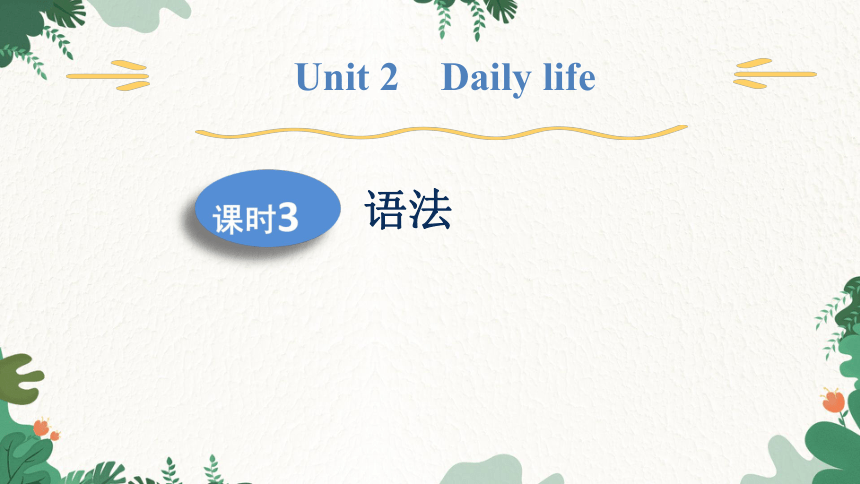 | |
| 格式 | pptx | ||
| 文件大小 | 2.3MB | ||
| 资源类型 | 教案 | ||
| 版本资源 | 牛津深圳版 | ||
| 科目 | 英语 | ||
| 更新时间 | 2023-07-25 16:07:42 | ||
图片预览

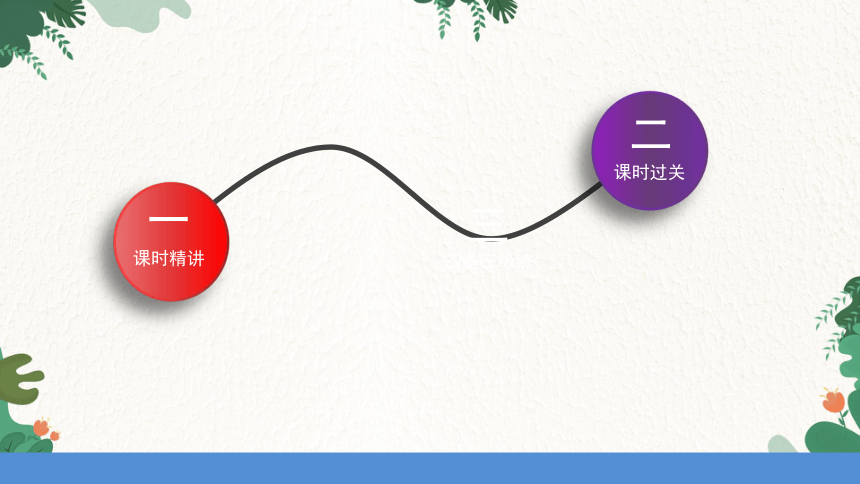
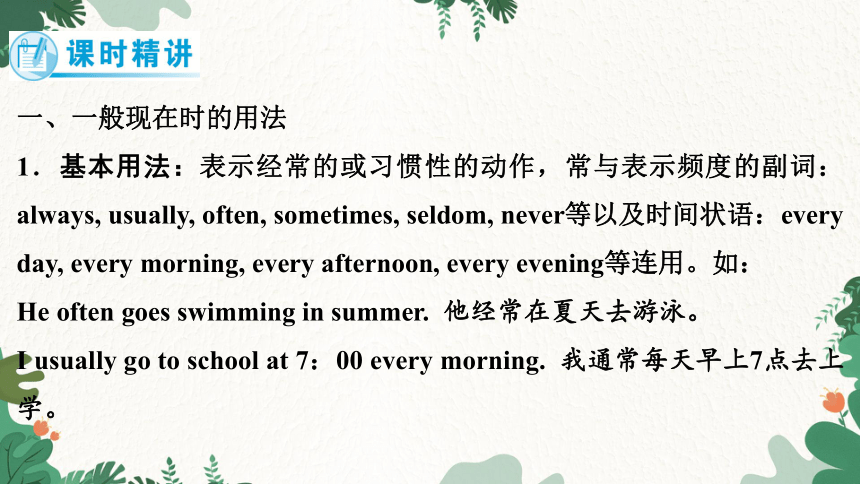
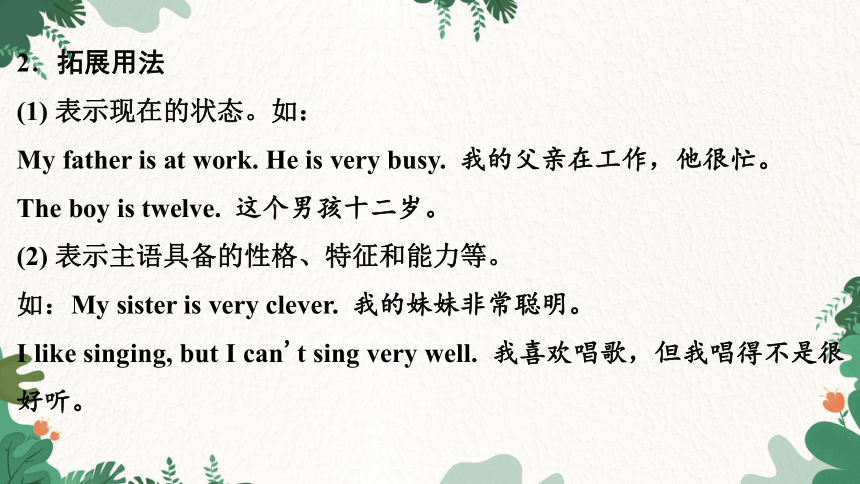
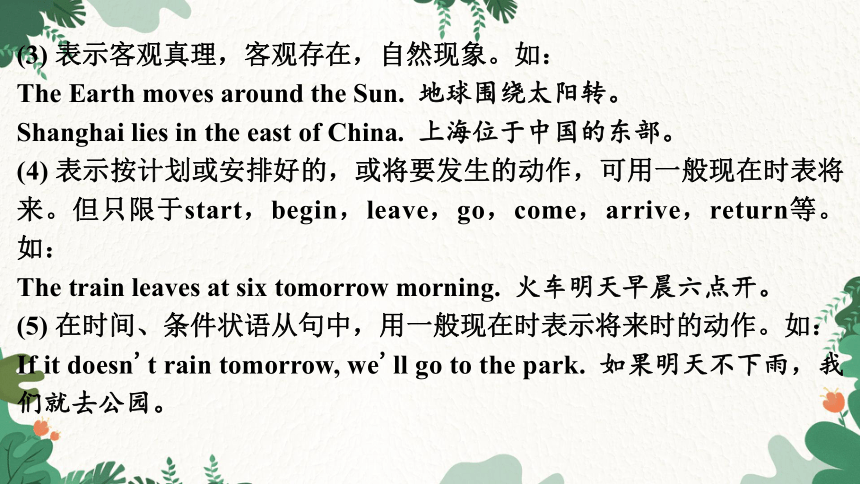
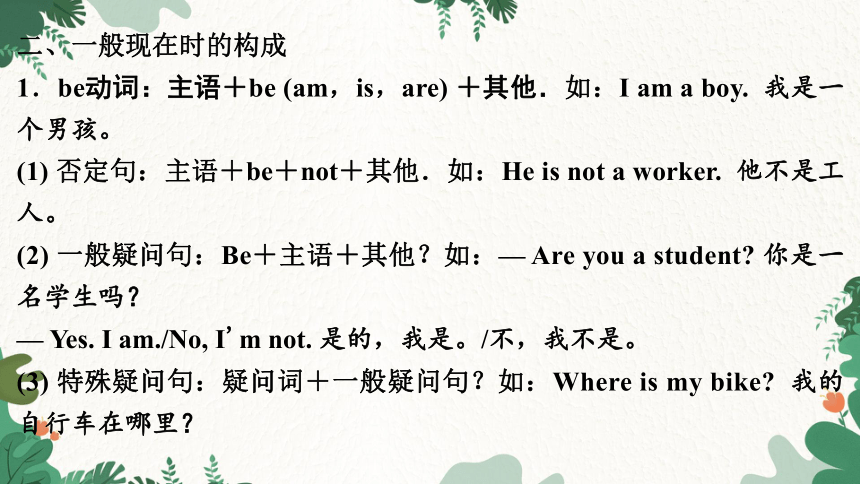
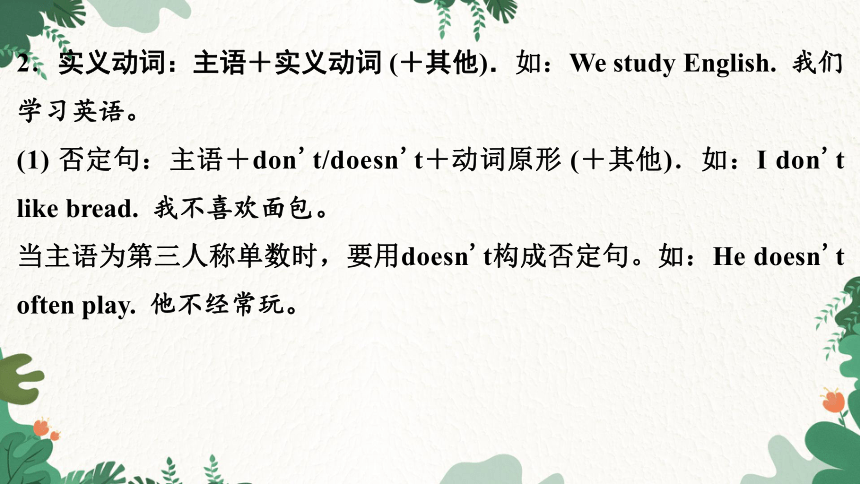
文档简介
(共18张PPT)
Unit 2 Daily life
课时3
语法
一
课时精讲
三
四基三级练
二
课时过关
一、一般现在时的用法
1.基本用法:表示经常的或习惯性的动作,常与表示频度的副词: always, usually, often, sometimes, seldom, never等以及时间状语:every day, every morning, every afternoon, every evening等连用。如:
He often goes swimming in summer. 他经常在夏天去游泳。
I usually go to school at 7:00 every morning. 我通常每天早上7点去上学。
2.拓展用法
(1) 表示现在的状态。如:
My father is at work. He is very busy. 我的父亲在工作,他很忙。
The boy is twelve. 这个男孩十二岁。
(2) 表示主语具备的性格、特征和能力等。
如:My sister is very clever. 我的妹妹非常聪明。
I like singing, but I can't sing very well. 我喜欢唱歌,但我唱得不是很好听。
(3) 表示客观真理,客观存在,自然现象。如:
The Earth moves around the Sun. 地球围绕太阳转。
Shanghai lies in the east of China. 上海位于中国的东部。
(4) 表示按计划或安排好的,或将要发生的动作,可用一般现在时表将来。但只限于start,begin,leave,go,come,arrive,return等。如:
The train leaves at six tomorrow morning. 火车明天早晨六点开。
(5) 在时间、条件状语从句中,用一般现在时表示将来时的动作。如:
If it doesn't rain tomorrow, we'll go to the park. 如果明天不下雨,我们就去公园。
二、一般现在时的构成
1.be动词:主语+be (am,is,are) +其他.如:I am a boy. 我是一个男孩。
(1) 否定句:主语+be+not+其他.如:He is not a worker. 他不是工人。
(2) 一般疑问句:Be+主语+其他?如:— Are you a student 你是一名学生吗?
— Yes. I am./No, I'm not. 是的,我是。/不,我不是。
(3) 特殊疑问句:疑问词+一般疑问句?如:Where is my bike 我的自行车在哪里?
2.实义动词:主语+实义动词 (+其他).如:We study English. 我们学习英语。
(1) 否定句:主语+don't/doesn't+动词原形 (+其他).如:I don't like bread. 我不喜欢面包。
当主语为第三人称单数时,要用doesn't构成否定句。如:He doesn't often play. 他不经常玩。
(2) 一般疑问句:Do/Does+主语+动词原形+其他?如:
— Do you often play football 你经常踢足球吗?
— Yes, I do./No, I don't. 是的。/不,我没有。
当主语为第三人称单数时,要用does构成一般疑问句。如:
— Does she go to work by bike 她骑自行车去上班吗?
— Yes, she does./No, she doesn't. 是的。/不,她不是。
(3) 特殊疑问句:疑问词+一般疑问句?如:How does your father go to work 你爸爸如何去上班?
注意: 当主语为第三人称单数 (he, she, it) 时,谓语动词要用第三人称单数形式,变化规则如下:
(1) 一般情况下,直接加-s。如:cook—cooks, milk—milks, work—works
(2) 以s,x,sh,ch,o结尾,加-es。如:guess—guesses,wash—washes,watch—watches,go—goes
(3) 以“辅音字母+y”结尾,变y为i, 再加-es。如:study—studies, carry—carries
(4) 特殊变化:have—has
三、拓展知识点归纳
1.频度副词的程度 always>usually>often>sometimes>seldom>never
注意:sometimes,some times,sometime,some time的区别
2.表示频度的短语的构成
(1) 由“次数+a+时间范围”构成: once/twice a day/week/month/
year
(2) 由“every+表时间的名词”构成: every day/week/month/year
以上两种频度短语都可以用于回答以“How often”提问的问句。
3.频度副词或短语的位置
频度副词通常放在be动词和情态动词的后面,实义动词的前面。如:
She always gets to school on time. 她总是准时到学校。
She is never late for school. 她上学从不迟到。
She can always remember everything clearly. 她总是能清楚地记得一切。
一、根据句意,用适当的频度副词填空。
1.My younger brother __________ gets up early, so he is never late for school.
2.We often eat at home, but we ___________ eat out.
3.My dad is busy with his work, so he ________ has time to travel with us.
4.Lily likes to play the piano, but I don't like it at all. I _______ play it.
always
sometimes
seldom
never
二、用所给词的适当形式填空。
1.Read the _______ (day) English and try to recite(背诵) it.
2.Lily _______ (ride) a bike to school every day.
3.It is _________ (usually) to snow in June in Beijing.
4.The meeting started at 9 a.m., and _______ (end) at noon.
5.Tom practises _________ (play) the guitar on Sundays.
daily
rides
unusual
ended
playing
6.When the bell ______ (ring), Mr.Li was coming into the classroom.
7.Lucy always ______ (go) to bed at 9 p.m.
8.You should brush your _______ (tooth) every morning.
9.— How often do you go shopping? — ________ (two) a week.
10.Did you enjoy ____________ (you) at Sam's birthday party, boys and girls
rang
goes
teeth
Twice
yourselves
三、按要求改写句子。
1.They swim in this swimming pool in summer. (改为否定句)
____________________________________________________
2.That blue bird does not fly here every morning. (改为肯定句)
___________________________________________
3.They take a bus to school every day. (改为一般疑问句)
___________________________________________
They don't swim in this swimming pool in summer.
That blue bird flies here every morning.
Do they take a bus to school every day?
4.Ann goes to violin lessons on Fridays. (对画线部分提问)
________________________________________
5.My parents visit my grandfather twice a month. (对画线部分提问)
_____________________________________________________
When does Ann go to violin lessons?
How often do your parents visit your grandfather?
谢谢大家!
Unit 2 Daily life
课时3
语法
一
课时精讲
三
四基三级练
二
课时过关
一、一般现在时的用法
1.基本用法:表示经常的或习惯性的动作,常与表示频度的副词: always, usually, often, sometimes, seldom, never等以及时间状语:every day, every morning, every afternoon, every evening等连用。如:
He often goes swimming in summer. 他经常在夏天去游泳。
I usually go to school at 7:00 every morning. 我通常每天早上7点去上学。
2.拓展用法
(1) 表示现在的状态。如:
My father is at work. He is very busy. 我的父亲在工作,他很忙。
The boy is twelve. 这个男孩十二岁。
(2) 表示主语具备的性格、特征和能力等。
如:My sister is very clever. 我的妹妹非常聪明。
I like singing, but I can't sing very well. 我喜欢唱歌,但我唱得不是很好听。
(3) 表示客观真理,客观存在,自然现象。如:
The Earth moves around the Sun. 地球围绕太阳转。
Shanghai lies in the east of China. 上海位于中国的东部。
(4) 表示按计划或安排好的,或将要发生的动作,可用一般现在时表将来。但只限于start,begin,leave,go,come,arrive,return等。如:
The train leaves at six tomorrow morning. 火车明天早晨六点开。
(5) 在时间、条件状语从句中,用一般现在时表示将来时的动作。如:
If it doesn't rain tomorrow, we'll go to the park. 如果明天不下雨,我们就去公园。
二、一般现在时的构成
1.be动词:主语+be (am,is,are) +其他.如:I am a boy. 我是一个男孩。
(1) 否定句:主语+be+not+其他.如:He is not a worker. 他不是工人。
(2) 一般疑问句:Be+主语+其他?如:— Are you a student 你是一名学生吗?
— Yes. I am./No, I'm not. 是的,我是。/不,我不是。
(3) 特殊疑问句:疑问词+一般疑问句?如:Where is my bike 我的自行车在哪里?
2.实义动词:主语+实义动词 (+其他).如:We study English. 我们学习英语。
(1) 否定句:主语+don't/doesn't+动词原形 (+其他).如:I don't like bread. 我不喜欢面包。
当主语为第三人称单数时,要用doesn't构成否定句。如:He doesn't often play. 他不经常玩。
(2) 一般疑问句:Do/Does+主语+动词原形+其他?如:
— Do you often play football 你经常踢足球吗?
— Yes, I do./No, I don't. 是的。/不,我没有。
当主语为第三人称单数时,要用does构成一般疑问句。如:
— Does she go to work by bike 她骑自行车去上班吗?
— Yes, she does./No, she doesn't. 是的。/不,她不是。
(3) 特殊疑问句:疑问词+一般疑问句?如:How does your father go to work 你爸爸如何去上班?
注意: 当主语为第三人称单数 (he, she, it) 时,谓语动词要用第三人称单数形式,变化规则如下:
(1) 一般情况下,直接加-s。如:cook—cooks, milk—milks, work—works
(2) 以s,x,sh,ch,o结尾,加-es。如:guess—guesses,wash—washes,watch—watches,go—goes
(3) 以“辅音字母+y”结尾,变y为i, 再加-es。如:study—studies, carry—carries
(4) 特殊变化:have—has
三、拓展知识点归纳
1.频度副词的程度 always>usually>often>sometimes>seldom>never
注意:sometimes,some times,sometime,some time的区别
2.表示频度的短语的构成
(1) 由“次数+a+时间范围”构成: once/twice a day/week/month/
year
(2) 由“every+表时间的名词”构成: every day/week/month/year
以上两种频度短语都可以用于回答以“How often”提问的问句。
3.频度副词或短语的位置
频度副词通常放在be动词和情态动词的后面,实义动词的前面。如:
She always gets to school on time. 她总是准时到学校。
She is never late for school. 她上学从不迟到。
She can always remember everything clearly. 她总是能清楚地记得一切。
一、根据句意,用适当的频度副词填空。
1.My younger brother __________ gets up early, so he is never late for school.
2.We often eat at home, but we ___________ eat out.
3.My dad is busy with his work, so he ________ has time to travel with us.
4.Lily likes to play the piano, but I don't like it at all. I _______ play it.
always
sometimes
seldom
never
二、用所给词的适当形式填空。
1.Read the _______ (day) English and try to recite(背诵) it.
2.Lily _______ (ride) a bike to school every day.
3.It is _________ (usually) to snow in June in Beijing.
4.The meeting started at 9 a.m., and _______ (end) at noon.
5.Tom practises _________ (play) the guitar on Sundays.
daily
rides
unusual
ended
playing
6.When the bell ______ (ring), Mr.Li was coming into the classroom.
7.Lucy always ______ (go) to bed at 9 p.m.
8.You should brush your _______ (tooth) every morning.
9.— How often do you go shopping? — ________ (two) a week.
10.Did you enjoy ____________ (you) at Sam's birthday party, boys and girls
rang
goes
teeth
Twice
yourselves
三、按要求改写句子。
1.They swim in this swimming pool in summer. (改为否定句)
____________________________________________________
2.That blue bird does not fly here every morning. (改为肯定句)
___________________________________________
3.They take a bus to school every day. (改为一般疑问句)
___________________________________________
They don't swim in this swimming pool in summer.
That blue bird flies here every morning.
Do they take a bus to school every day?
4.Ann goes to violin lessons on Fridays. (对画线部分提问)
________________________________________
5.My parents visit my grandfather twice a month. (对画线部分提问)
_____________________________________________________
When does Ann go to violin lessons?
How often do your parents visit your grandfather?
谢谢大家!
